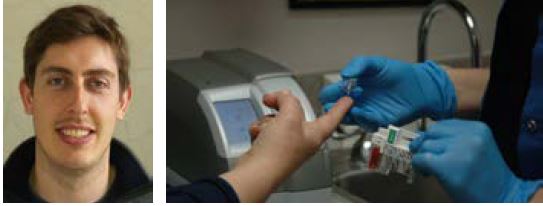Understanding mechanisms of therapeutic resistance in colorectal cancer
Colon and rectal cancers (the two types of bowel cancer) are often treated with anti-cancer therapies designed to shrink the tumour and reduce the risk of recurrence after surgery. There is considerable variation in how tumours respond to these therapies. Therapy response can often dictate further management of the cancer, including how a tumour might be managed surgically. Therefore, understanding the biology underlying therapy response/resistance is critical in improving survival/cancer outcomes and management options for patients.
The research carried out by Mr Adam Chambers focuses on how inflammatory signalling pathways such as BCL-3 and NF-kB contribute to therapy resistance in colorectal cancer. As a colorectal surgeon, Mr Chambers has set-up a study (SectR) to collect blood and tissue samples for analysis in the lab; these laboratory findings can then be translated across to clinical samples. Several novel techniques have been introduced to the wider Colorectal Tumour Biology (CTB) group such as ultra-low pass whole genome sequencing (a DNA-sequencing technology used to detect genetic variation within the genome), ATAC-See and ATAC-Seq, which enable the analysis of small pieces of DNA that are released into a person’s blood by tumour cells as they die (known as circulating free DNA or ctDNA). The use of ctDNA focuses on the measurement therapeutic response, but the techniques also help to determine how changes to chromatin compaction alter therapy response in rectal cancer samples. These data support other findings from the group showing that the mechanism of action of BCL-3 may be through driving changes to chromatin state leading to the downstream effects observed in transcriptional regulation and the DNA damage response.
Through collaboration with clinicians at University Hospitals Bristol and Weston NHS Foundation Trust, the group has published data regarding the changing incidence of early-onset colorectal cancer. This work will also make use of the novel assays on ctDNA to elucidate differences in biology between early and late onset sporadic colorectal cancers.
https://www.bristol.ac.uk/people/person/Adam%20C-Chambers-62e0c87e-d883-423f-9c64-a1cacf1677e0/
Publications:
- Chambers AC et al. (2022). BCL-3 loss sensitises colorectal cancer cells to DNA damage by targeting homologous recombination. DNA Repair.
- Chambers AC et al. (submitted). BCL-3 is a critical mediator of colorectal cancer apoptosis through repressing BIM expression.
- Chambers AC et al. (2020). Demographic trends in the incidence of young-onset colorectal cancer: a population-based study. British Journal of Surgery.

Left: Mr Adam Chambers. Right: Taking blood samples for laboratory analysis helps us understand what therapies are working.